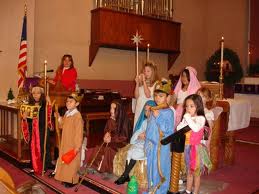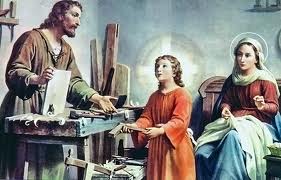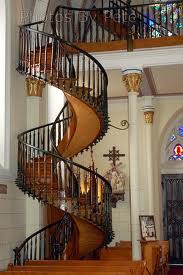In my religious tradition, we didn’t do saints. We did do Christmas pageants —big time. I remember in various pageants being an angel, a wise man, a shepherd—all of the usual male roles. My most triumphant pageant appearance, though, was the year I got to be Joseph. Wearing a white dish towel on my head secured with a bathrobe belt, I gazed with a holy aspect at the plastic headed Jesus in the make-shift manger while the narrator read the Christmas story. Actually, I was gazing at Mary, played by Bonnie, whom I was planning to marry in 15-20 years. It was my usual pattern when I was in single digits of age. If I thought a girl was cute, I’d think “you’re cute—I wonder what our children will look like.” Of course I always thought these things—I never said them.
—big time. I remember in various pageants being an angel, a wise man, a shepherd—all of the usual male roles. My most triumphant pageant appearance, though, was the year I got to be Joseph. Wearing a white dish towel on my head secured with a bathrobe belt, I gazed with a holy aspect at the plastic headed Jesus in the make-shift manger while the narrator read the Christmas story. Actually, I was gazing at Mary, played by Bonnie, whom I was planning to marry in 15-20 years. It was my usual pattern when I was in single digits of age. If I thought a girl was cute, I’d think “you’re cute—I wonder what our children will look like.” Of course I always thought these things—I never said them.
Today is the Feast of St. Joseph the Worker.![images[10]](https://wp-media.patheos.com/blogs/sites/766/2012/11/images10.jpg) Until I became familiar as an adult with what Catholics do, I didn’t know that Joseph had his own day. I wonder if he minds competing with St. Patrick, who is feted with corned beef, soda bread, parades, and green beer just two days earlier. Joseph didn’t get a lot of play (other than hanging around and looking holy in the Christmas pageant) when I was growing up. He was a necessary part of the story, doing carpenter things, banging on the doors of inns with “No Vacancy” signs, having important dreams (maybe the best dreamer in the Bible other than his namesake in Genesis)—more than a bit player, but no more than supporting cast. I’ve come to admire him more than just about anyone else in the Bible, though. I know he was the earthly father of Jesus and all, but what impresses me was that he was Jesus’ stepfather.
Until I became familiar as an adult with what Catholics do, I didn’t know that Joseph had his own day. I wonder if he minds competing with St. Patrick, who is feted with corned beef, soda bread, parades, and green beer just two days earlier. Joseph didn’t get a lot of play (other than hanging around and looking holy in the Christmas pageant) when I was growing up. He was a necessary part of the story, doing carpenter things, banging on the doors of inns with “No Vacancy” signs, having important dreams (maybe the best dreamer in the Bible other than his namesake in Genesis)—more than a bit player, but no more than supporting cast. I’ve come to admire him more than just about anyone else in the Bible, though. I know he was the earthly father of Jesus and all, but what impresses me was that he was Jesus’ stepfather.
I’m not a step-parent, but I’ve observed one from close range for close to thirty years. On the day before Thanksgiving in 1987, my sons (ages eight and five) and I met Jeanne, a red haired, green eyed ball of energy (she’s been called a “force of nature”) at my parents’ house. My parents had known her for a number of years. I was recently divorced, nature took its course, and Jeanne and I were together just a few short weeks afterwards. But with me Jeanne got a “three-fer.” She did it willingly—I even remember her telling me that she always thought she’d end up marrying someone who already had kids. But there’s no more difficult role for any human being to step into, no more thankless task. That’s why I love Joseph, because he makes me think about the person I love the most.
My parents had known her for a number of years. I was recently divorced, nature took its course, and Jeanne and I were together just a few short weeks afterwards. But with me Jeanne got a “three-fer.” She did it willingly—I even remember her telling me that she always thought she’d end up marrying someone who already had kids. But there’s no more difficult role for any human being to step into, no more thankless task. That’s why I love Joseph, because he makes me think about the person I love the most.
I wonder how Joseph processed being handed an impossible job, with no blueprint or instruction manual. All he wanted to do was marry the person he loved. God said, “Okay, but here are a few other things you get to do too.”  I wonder if Joseph and Mary, overwhelmed with the task before them, threw themselves so wholeheartedly into the process of making this stepfamily work that they neglected for long periods of time to pay attention to their own relationship with each other. Did Joseph ever wonder when it would be “his time,” when he would be valued for who he was rather than for what he could do for Jesus, or Mary, or God? I wonder if Joseph ever saw “you’re not my real dad” in Jesus’ eyes or actions. Did Joseph ever resent Jesus’ biological connection with Mary, something that nothing Joseph ever did or said could possibly balance out? I wonder if Jesus ever told Joseph, at least when he had grown up, that he appreciated Joseph and that he apologized for the times he’d been a jerk.
I wonder if Joseph and Mary, overwhelmed with the task before them, threw themselves so wholeheartedly into the process of making this stepfamily work that they neglected for long periods of time to pay attention to their own relationship with each other. Did Joseph ever wonder when it would be “his time,” when he would be valued for who he was rather than for what he could do for Jesus, or Mary, or God? I wonder if Joseph ever saw “you’re not my real dad” in Jesus’ eyes or actions. Did Joseph ever resent Jesus’ biological connection with Mary, something that nothing Joseph ever did or said could possibly balance out? I wonder if Jesus ever told Joseph, at least when he had grown up, that he appreciated Joseph and that he apologized for the times he’d been a jerk.
I![220px-Loretto_Chapel_Ext[1] (2)](http://wp.production.patheos.com/blogs/freelancechristianity/files/2012/09/220px-loretto_chapel_ext1-2.jpg?w=150) n Santa Fe, there is a little church called the Loretto Chapel, which contains a “miraculous staircase,” built by a stranger with a donkey and a toolbox who showed up in answer to the prayers of the Sisters of Loretto. The newly built chapel needed a staircase to the choir loft; those who knew about such things said it would have to be a ladder, since a regular stairway would be too invasive of the chapel space.
n Santa Fe, there is a little church called the Loretto Chapel, which contains a “miraculous staircase,” built by a stranger with a donkey and a toolbox who showed up in answer to the prayers of the Sisters of Loretto. The newly built chapel needed a staircase to the choir loft; those who knew about such things said it would have to be a ladder, since a regular stairway would be too invasive of the chapel space. The stranger built an architectural marvel, a spiral staircase containing two 360 degree turns with no visible means of support and held together with wooden pegs rather than nails. The stranger disappeared without being paid after completing the staircase; not surprisingly, legend has it that the donkey-riding stranger was none other than St. Joseph, patron saint of carpenters.
The stranger built an architectural marvel, a spiral staircase containing two 360 degree turns with no visible means of support and held together with wooden pegs rather than nails. The stranger disappeared without being paid after completing the staircase; not surprisingly, legend has it that the donkey-riding stranger was none other than St. Joseph, patron saint of carpenters.
Carpenters need a patron saint—I suppose everyone in every walk of life does. I’m sure Joseph was a fabulous carpenter, maybe even capable of building a miraculous staircase. But various websites tell me that Thomas More is the patron saint of step-parents, which makes no sense. For step-parenting is a far more impossible task than the construction of any number of miraculous staircases. Joseph took it on and pulled off a real miracle—being a parent to and, along with Mary, raising a child who was not his. And just like the Sisters of Loretto, I needed a miraculous answer to an impossible situation—how was I going to raise these kids by myself? Jeanne in my parents’ living room the night before Thanksgiving was as unexpected as a stranger on a donkey with the tools and ability to build a miraculous staircase. I made out better than the Sisters of Loretto, though, because the miracle stranger didn’t leave. I can no more repay her than the Sisters could have paid Joseph—how do you repay someone who changed three lives?
I needed a miraculous answer to an impossible situation—how was I going to raise these kids by myself? Jeanne in my parents’ living room the night before Thanksgiving was as unexpected as a stranger on a donkey with the tools and ability to build a miraculous staircase. I made out better than the Sisters of Loretto, though, because the miracle stranger didn’t leave. I can no more repay her than the Sisters could have paid Joseph—how do you repay someone who changed three lives?











